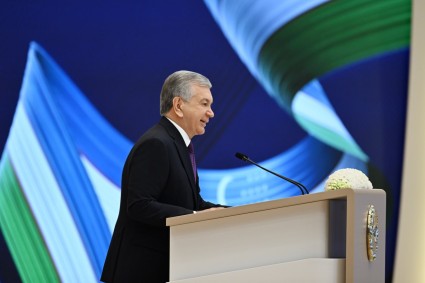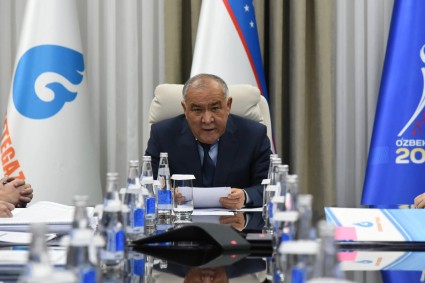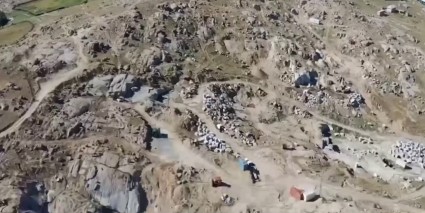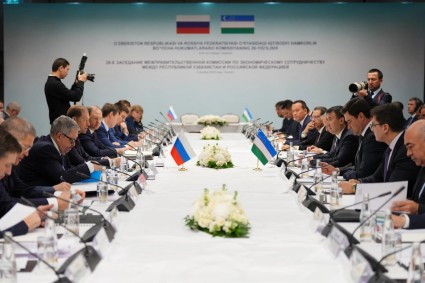On 13-14 April, 2017 representatives of diplomatic corps and international organizations accredited in Uzbekistan, representatives of ministries, agencies, national and regional mass media took part in the field trip to the Republic of Karakalpakstan organized within the UN Joint Programme“Building the resilience of communities affected by the Aral Sea disaster through the Multi-Partner Human Security Fund for the Aral Sea”.The trip was aimed at showcasing the results of the first phase of the UN Joint Programme, raise the awareness of participants on importance of concerted efforts in support to development of the Aral sea region and aiming at expanded donor assistance to the region through the proposed Multi-Partner Human Security Fund for Aral Sea region.
The first visit by participants was made to a meteorological station in Nukus city, where the equipment for automation of collection and transfer of hydrometeorological data was installed in March 2017. Participants of the station launch ceremony learned about its operating principles, specific control features and capacities of immediate data transfer.
After greeting the high-ranking guests at the meteorological station launch ceremony, Mr. Stefan Priesner, UN Resident Coordinator, UNDP Resident Representative in Uzbekistan, has underlined the readiness of the United Nations operating in the country to support the Government of Uzbekistan and local communities affected by the Aral Sea disaster through addressing various issues associated with ensuring human security.
Notably, that UNDP in Uzbekistan in collaboration with the Centre of Hydrometeorological Service under the Cabinet of Ministers of the Republic of Uzbekistan is implementing a “Developing climate resilience of farming communities in the drought prone parts of Uzbekistan” project in the Republic of Karakalpakstan with financial support of the Adaptation Fund. This project is being implemented in five pilot districts of Karakalpakstan focusing on introduction of climate change adaptation measures, increasing the resilience of farming communities and dekhkan farms, rural households and communities to such climate-related hazards as growing shortage of water resources, frequent droughts, degradation of cultivated land and pastures. Among others, the project is in the process ofmodernization of ten similar meteorological stations and two hydrological stations in Karakalpakstan. In addition, the Adaptation Fund project promotes innovative solutions in water management such as early warning system aiming for timely assessment of the condition of water bodies using, among others, hydrometeorological monitoring data. Special focus on these natural phenomena is its affect on living conditions of disaster affected communities and causing threats to food security of the country, in general.
Further, at the office of the UN Joint Programme in Nukus the participants were introduced with brief overview on priorities of the UN support in the Aral Sea region as well as plans of the new UN Joint Programme in the Aral sea region aimed for concerted efforts of multiple stakeholders and donor community within the proposed UN Multi-Partner Humans Security Fund for the Aral Sea.
Visits to the Muynak Museum of local history and Muynak Ship Graveyard allowed to form a bigger picture of livelihoods in Karakalpakstan both in past and modern realities.
Diversification of activities of local population, introduction of new income generation opportunities helping to create jobs in such pilot districts as Kanlikul, Shumanay, Muynak, and soon in Takhtakupir, are in progress within the scope of the UN initiatives in the Aral Sea region. Thus, the UN Joint Programme supported establishment of a workshop for national embroidery and production of souvenirs from seashells “Qaraqalpaq Sheberi Manzura” managed by Manzura Erniyazova.
‘Our enterprise was established four years ago, and since then, we, together with my apprentices, accomplished a large amount of work on presenting traditional handicraft, fabric patterns created by our ancestors. Thanks to these efforts, unique design of the Karkalpak embroidery is now known in many countries, and it makes me happy. We want to extend the list of goods offered, and soon, we will start producing goods applying not only Karakalpak patterns but also Uzbek ornaments, because every region has its exceptional style and fabric design,’ she told.
In addition, to many support interventions, the UN Joint Programme provided assistance in installation ofsolar panels for uninterrupted electricity supply in nine rural healthcare facilities of the Muynak district. Trainings for operating personnel of rural health facilities on application and utilization of new energy efficient technologies using renewable energy sources was organized by the programme.
During the visit tothe rural health facility “Aral” covering population of “Tik-ozek” community, the guests saw in practice the utilization efficiency of solar panels ensuring uninterrupted use of medical devices and equipment and full-scale work of a diagnostic laboratory that have significantly raised the quality of medical service to the local population.
Concerns about health and welfare of people are mirrored in the next project on honey canning and wax production, which was established within the scope of the first phase of the Joint Programme. This facility allows to cover both social and economic aspects at a local level. On one hand, it represents development of local entrepreneurship where four employees are involved, food security concern and manufacturing of environmentally friendly products, on the other hand, dekhkan and farming communities cooperating with the Programme supply each senior citizen with 5-10 kg of honey annually absolutely for free.
As the study tour showed, the primary goal of the UN activities in Karakalpakstan is to improve the quality of livelihood and enhance the income generation opportunities for population reflecting the key priorities of the State Programme for 2017, “The Year of Dialogue with the People and Human Interests”, and objectives specified in the State Programme for Development of the Aral Sea region for 2017-2021.
One of the major goals of the new phase of the UN Joint Programme is the establishment of a Multi-Partner International Human Security Fund in the region. Activities of this Fund will be aimed, above all, at developing an effective mechanism for coordination of the initiatives and the extensive mobilization of funds invested by the international community in the development of the Aral Sea region,in the format of a coordinated and single regional development Programme.











